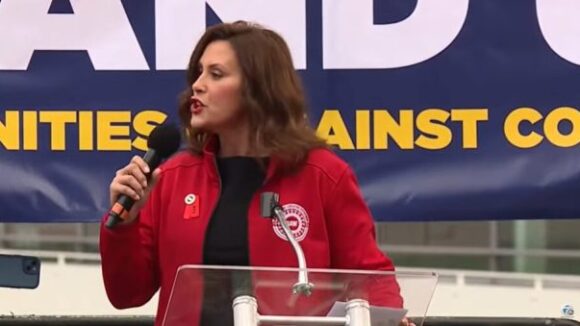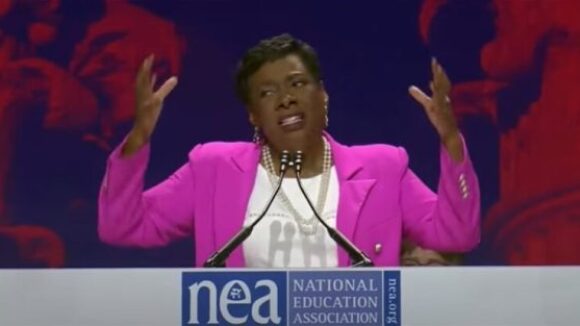Tyranny Triumphs in the Great Lakes State
Ignoring ample evidence of forced unionism’s unfairness and its damaging impact on jobs and incomes, Big Labor Michigan Gov. Gretchen Whitmer signed Right to Work destruction in 2023.

Government Unionism Still Being Foisted on Dissenting Employees
While the U.S. Supreme Court recently took a significant step toward restoring government employees’ personal freedom to choose whether or not to associate with a labor organization, it also left in place widespread statutory provisions that put each unionized worker under a powerful compulsion.
In Janus v. AFSCME Council 31, a case in which the National Right to Work Legal Defense Foundation furnished free legal assistance to the plaintiff, a High Court majority ruled that it violates the First Amendment to force public workers to pay money to a labor union as a condition of continued public employment.
Janus effectively made all 50 states Right to Work states for educators, public-safety officers, and other state and local public servants. This represents remarkable progress.
However, the Janus decision did not address the constitutionality of what economist Charles Baird, professor emeritus at California State University, East Bay, aptly calls “an equally burdensome affront to individual liberty in government employment,” so-called “exclusive representation.”
Justice Alito: ‘Exclusivity’ Substantially ‘Restricts the Rights of Individual Employees’
In jurisdictions where such “exclusivity” is authorized and promoted, a union may acquire the power, in Dr. Baird’s words again, “to represent the workers who voted for it, the workers who voted against it, and the workers who didn’t vote.”
In a constitutional republic like the United States, it is common for private organizations to make internal decisions by majority vote, but unacceptable for any private organization to be accorded power by the government to force private individuals to associate with it.
Justice Samuel Alito’s Janus majority opinion, which was announced on June 27, acknowledged that “[d]esignating a union as the employees’ exclusive representative substantially restricts the rights of individual employees.”
How, then, did the Janus Court not find government-sector union monopoly bargaining to be in violation of the First Amendment?
Even though the Supreme Court ruled against union officials and their lawyers on Janus’ core issue of public-sector forced union dues and fees, all nine justices apparently granted Big Labor’s outlandish premise that union monopoly bargaining may advance “compelling government interests.”
Mark Mix, president of the National Right to Work Committee as well as the Right to Work Foundation, commented:
“Part of the Janus opinion actually states that banning compelled employee financial support for government unions is acceptable because such a ban will not prevent government union bosses from exercising their powers as public employees’ monopoly bargaining agents!
“Although this aspect of Janus is disappointing, Right to Work attorneys are continuing to seek out public-sector employee clients who are interested in fighting for their right not to be represented by an unwanted union. This is the next mission.”
State Lawmakers Still Have The Ability and the Duty To Protect Employees
Of course, judges are not the only people who have the authority to redress constitutional wrongs.
“When a state law violates the U.S. Constitution,” explained Mr. Mix, “state lawmakers and chief executives have the ability and the duty to repeal or amend the law to bring it into accord with the Constitution, regardless of what the judiciary decides to do.
“The vast majority of the 50 states currently have statutes on the books forcing some or all types of public employees to be subject to union monopoly bargaining in order to work for taxpayers.
“Post-Janus, none of these monopoly-bargaining laws actually forces employees to support financially a union they wouldn’t join voluntarily.
“However, as the late Thomas E. Harris, then a top AFL-CIO lawyer, acknowledged back in 1962, union officials often use their monopoly-bargaining privileges like a cattle prod to herd more workers under their control, and punish those who resist.
“‘The fact that the union will negotiate the contract which regulates the incidents of [a worker’s] industrial life puts him under powerful compulsion to join the union,’ said Mr. Harris.
“This observation remains true today. That’s why the fight against government-sector compulsory unionism won’t truly be over until union ‘exclusivity’ is barred in all 50 states.”

Ignoring ample evidence of forced unionism’s unfairness and its damaging impact on jobs and incomes, Big Labor Michigan Gov. Gretchen Whitmer signed Right to Work destruction in 2023.

Largely thanks to the Right to Work attorney-won U.S. Supreme Court decision in Janus v. AFSCME, union bosses like NEA President Becky Pringle are no longer able to block virtually all meaningful education policy reforms.

Avelo employee Kim Howard believes all the firm’s flight attendants should get to vote on continued AFA rule. Credit: WTNH-TV (ABC,…